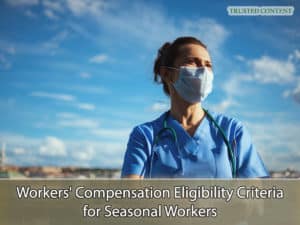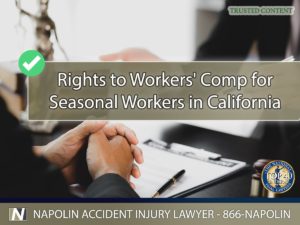Understanding Rights to Workers’ Comp for Seasonal Workers in California
Seasonal workers form the backbone of many industries in southern California, providing essential labor during peak seasons. Yet, when workplace injuries occur, these workers often face unique challenges in securing workers' compensation benefits. Understanding their rights is crucial to ensure they receive proper compensation and medical care. Navigating the complexities of the California workers' compensation system can be daunting for seasonal workers, especially given the unique nature of their employment status.
At Napolin Accident Injury Lawyer, we have extensive litigation experience in workers' compensation law. This article offers a comprehensive guide on the challenges and rights of seasonal workers regarding workers' compensation in California. By offering clarity on legal definitions, eligibility requirements, and the claims process, this guide aims to empower seasonal workers to advocate for their rights confidently.
Workers' Compensation Law in California: An Overview
California mandates workers' compensation insurance for all employers to cover work-related injuries and illnesses. The system ensures that injured employees receive medical care, temporary or permanent disability benefits, and vocational rehabilitation. Employers are required by law to carry workers' compensation insurance or become self-insured to cover these costs.
This provides a no-fault system, meaning injured workers do not need to prove employer negligence to receive benefits. Instead, workers only need to demonstrate that the injury or illness occurred while performing job-related tasks. This inclusive approach ensures that employees are protected, regardless of the nature or cause of the incident. However, certain exclusions and limitations exist, emphasizing the need for legal guidance.
Coverage and Eligibility
Any worker classified as an employee is entitled to workers' compensation benefits. This includes full-time, part-time, and seasonal workers, provided they meet the eligibility criteria. Independent contractors are generally not covered, highlighting the importance of proper classification. Employers often misclassify workers to avoid providing benefits, which can have severe legal consequences.
California workers' comp covers a wide range of benefits, including medical treatment, temporary disability, permanent disability, vocational rehabilitation, and death benefits. Medical treatment benefits ensure workers receive necessary care without out-of-pocket expenses. Temporary disability benefits replace lost wages for workers temporarily unable to work, while permanent disability benefits compensate those with lasting impairments. Vocational rehabilitation and death benefits provide additional support where required.
Who Are Seasonal Workers and How Are They Classified?
Seasonal workers are those employed for a specific period or season, often found in agriculture, hospitality, retail, and tourism industries. They play a crucial role in handling increased workloads during peak periods. Agriculture employs the most seasonal workers, followed by retail, hospitality, and construction. Other industries, such as entertainment and sports, also rely on seasonal employees.
California labor law considers seasonal workers employees if they work under the direction of an employer. However, classification challenges arise when employers attempt to label them as independent contractors to evade providing benefits. This misclassification directly impacts their ability to access workers' compensation benefits and other employee rights.
Legal Classification of Seasonal Workers
The legal classification of seasonal workers affects their eligibility for benefits. Under California law, an employee is someone who performs services for an employer in exchange for compensation. Independent contractors, on the other hand, operate their businesses and are not entitled to the same rights and benefits.
The “ABC test,” established by the California Supreme Court in the case Dynamex Operations West, Inc. v. Superior Court, helps distinguish employees from independent contractors. To classify a worker as an independent contractor, an employer must prove:
- The worker is free from the control and direction of the hiring entity
- The worker performs work outside the usual course of the hiring entity's business
- The worker is customarily engaged in an independently established trade, occupation, or business
If a worker does not meet all three criteria, they should be classified as an employee and are thus eligible for workers' compensation benefits.

Challenges Faced by Seasonal Workers in Accessing Workers' Compensation Benefits
Challenges Faced by Seasonal Workers in Accessing Workers' Compensation Benefits
Seasonal workers encounter several hurdles when seeking workers' compensation benefits, often due to their temporary or irregular work schedules. Understanding these challenges is essential to navigating the claims process effectively.
Limited Work Periods and Eligibility Issues
The short duration of employment can make it difficult to meet eligibility requirements, especially if employers misclassify seasonal workers or fail to keep accurate payroll records. Since eligibility often depends on work history and duration, seasonal workers may struggle to prove their employment status or injury timeline.
In addition, gaps between employment periods can complicate claims, particularly if a worker sustains an injury shortly after starting or just before ending a seasonal job. In such cases, meticulous documentation of work periods and job duties is vital to establish eligibility.
Employment Status and Misclassification
Employers may attempt to classify seasonal workers as independent contractors to avoid providing benefits. Such misclassification directly impacts workers' ability to access compensation. California's strict classification standards mean many seasonal workers are, in fact, employees, but proving this often requires legal assistance.
The “ABC test,” as mentioned earlier, plays a crucial role in these cases. Despite its clarity, many employers intentionally misclassify workers, leading to denied benefits. This issue is particularly prevalent in industries like agriculture and construction, where seasonal work is common.
Employers' Reluctance to Acknowledge Injuries
Some employers may be hesitant to report workplace injuries or classify seasonal workers as eligible for compensation, further complicating the claims process. Employers might fear higher insurance premiums or potential penalties, leading them to discourage injury reporting.
As a result, injured workers may be pressured to return to work prematurely or refrain from seeking medical care. Such reluctance leaves workers vulnerable to further injury and financial instability. California law requires employers to provide workers' compensation coverage regardless of the worker's status or injury nature.
Language Barriers and Lack of Awareness
Many seasonal workers come from diverse linguistic backgrounds and may struggle to understand their rights due to language barriers. This lack of awareness often results in delayed or incomplete claims, leading to denied benefits.
Employers should provide injury reporting forms and information in languages that workers understand. However, many fail to do so, leaving workers confused about the claims process. Legal assistance can help bridge this gap by ensuring workers understand their rights and how to exercise them.

Workers' Compensation Eligibility Criteria for Seasonal Workers
Workers' Compensation Eligibility Criteria for Seasonal Workers
Under California workers' compensation law, eligibility is primarily based on employment status. Seasonal workers must meet specific criteria to qualify for benefits:
- Be classified as employees (not independent contractors)
- Have sustained a work-related injury or illness
- Report the injury within 30 days to the employer
- File a claim within one year of the injury or illness
- Provide accurate medical and employment records
In addition to these criteria, workers must ensure their injury or illness is directly related to their job duties. This includes acute injuries like fractures and repetitive strain injuries that develop over time. Occupational illnesses, such as respiratory conditions caused by chemical exposure, are also covered.
Filing a Workers' Compensation Claim as a Seasonal Worker
Filing a claim as a seasonal worker involves several steps that require careful attention to detail. Missing deadlines or providing incomplete information can result in denied claims, making it essential to understand the process fully.
1. Report the Injury to the Employer
Workers must notify their employer of any work-related injury or illness within 30 days of occurrence. Employers are required to provide claim forms and information on the claims process. If an employer fails to provide this information, workers should contact the California Division of Workers' Compensation (DWC).
2. Fill Out a Workers' Compensation Claim Form (DWC-1)
The employer must provide the DWC-1 form. Completing and submitting this form formally begins the claims process. The worker should fill out all relevant sections, including a detailed description of the injury or illness and how it occurred. Employers must also complete their portion of the form and submit it to their insurance carrier.
3. Seek Medical Attention
Receiving prompt medical care and keeping accurate medical records are crucial to the claims process. Workers should seek treatment from a medical provider approved by their employer's insurance carrier. In emergency cases, workers may visit any provider for initial care.
Medical records should include detailed information about the injury, treatment received, and the physician's opinion on the worker's ability to return to work. This documentation forms the basis for determining benefits eligibility and compensation amounts.
4. Obtain Legal Representation
Due to the complexities of workers' compensation law, it's advisable for seasonal workers to consult a lawyer experienced in handling such cases. A knowledgeable attorney can help navigate the claims process, gather evidence, and represent workers in disputes with employers or insurance companies.
Legal representation is particularly crucial for workers facing employer retaliation or misclassification issues. An attorney can ensure that workers receive the benefits they are entitled to and protect them from unfair treatment.
5. Attend Independent Medical Examinations (IME)
Insurance companies may require workers to attend an IME to assess their injuries and verify their claims. These examinations are conducted by physicians chosen by the insurance carrier and are often used to dispute the severity of injuries or the need for extended benefits.
Workers should attend these examinations and provide honest, accurate information about their injuries and symptoms. An attorney can help prepare workers for IMEs to ensure their rights are protected during the examination process.
6. Dispute Resolution and Appeals
If a claim is denied or benefits are reduced, workers have the right to dispute the decision through the DWC. This involves filing an Application for Adjudication of Claim and requesting a hearing before a workers' compensation judge.
An attorney can help prepare for these hearings, gather evidence, and present a strong case. In some cases, disputes may be resolved through settlement negotiations or mediation. However, a formal hearing may be necessary for more complex cases.
Workers' Compensation Benefits Available to Seasonal Workers
Temporary Disability Benefits
Temporary disability benefits provide wage replacement for injured workers temporarily unable to work. They typically cover up to two-thirds of the worker's average weekly earnings, subject to minimum and maximum limits. Benefits continue until the worker reaches maximum medical improvement or returns to work.
Seasonal workers should keep accurate records of their earnings, as the benefits amount is based on pre-injury wages. Workers receiving temporary benefits must also comply with their doctor's recommendations and attend all required medical appointments.
Permanent Disability Benefits
If an injury leads to lasting impairment, workers may receive permanent disability benefits based on the degree of impairment. These benefits are determined using a percentage-based system that considers the worker's age, occupation, and the nature of the injury.
The Permanent Disability Rating Schedule (PDRS) is used to calculate the percentage of disability, which directly influences benefit amounts. Ratings can be disputed through the IME process or by seeking a second medical opinion.
Medical Treatment Benefits
Injured workers are entitled to all reasonable and necessary medical treatment to cure or relieve the effects of the injury. This includes emergency care, surgeries, physical therapy, prescription medications, and durable medical equipment.
Employers must provide a list of approved medical providers, but workers can choose their own doctor after 30 days. Medical treatment benefits also cover travel expenses to and from medical appointments.
Supplemental Job Displacement Benefits
Workers who cannot return to their previous jobs due to injuries may qualify for retraining vouchers. These vouchers, worth up to $6,000, can be used for education, retraining, and related expenses like books and equipment.
To qualify for these benefits, workers must receive a permanent disability rating and be unable to return to their pre-injury job. The voucher can be used at any state-approved school or vocational program to help workers gain new skills for reemployment.
Death Benefits
Surviving dependents of a deceased worker may receive death benefits to help cover funeral expenses and provide financial support. These benefits are available to spouses, children, and other dependents and vary based on the number of dependents and the worker's earnings.
Dependents must file a claim within one year of the worker's death to be eligible for benefits.
Employers' Responsibilities in Workers' Compensation Cases
Under California law, employers are required to:
- Provide workers' compensation insurance coverage
- Report all workplace injuries to their insurance carrier and relevant authorities
- Offer DWC-1 claim forms to injured workers
- Facilitate workers' access to medical care
- Cooperate with the claims process and avoid retaliating against injured workers
Providing Workers' Compensation Insurance Coverage
Employers must maintain workers' compensation insurance or obtain state approval to become self-insured. This ensures that workers receive benefits without the employer bearing direct financial responsibility.
The California Division of Workers' Compensation conducts audits to verify compliance, and penalties for non-compliance can be severe as covered in California Labor Code 3700.5. If an employer fails to secure workers' compensation insurance and knew or should have known about this requirement, it’s considered a misdemeanor. Punishment includes up to one year in county jail, a fine of up to twice the insurance premium they should have paid (but at least $10,000), or both.
A second or subsequent offense is punished by up to one year in county jail, a fine of up to three times the premium (but at least $50,000), or both.
For a first conviction, the court may charge the investigation costs. For any subsequent conviction, the employer must pay the investigation costs in addition to the penalties above, but only after settling any owed benefits and penalties to injured workers and the state.
Reporting Workplace Injuries
Employers must report all workplace injuries to their insurance carrier and the DWC within five days. This ensures that workers receive timely benefits and medical care. Failing to report injuries can result in penalties and delays in the claims process.
Employers are also required to maintain accurate injury records and provide them to workers upon request. Proper record-keeping is crucial for workers to establish the validity of their claims.
Offering DWC-1 Claim Forms
When a worker reports an injury, employers must provide the DWC-1 claim form within one working day. This form initiates the claims process and ensures that workers receive benefits promptly. Employers should also provide information on the claims process and workers' rights.
Facilitating Medical Care Access
Employers must facilitate workers' access to medical care by providing a list of approved medical providers. Workers can choose their own doctor after 30 days, but employers must ensure that initial treatment is timely and adequate.
Employers are prohibited from interfering with workers' medical care or pressuring them to return to work before they are medically cleared.
Cooperating with the Claims Process
Employers must cooperate with the claims process and provide accurate information to their insurance carrier and the DWC. Retaliating against workers for filing claims is illegal and can result in severe penalties.
Retaliation includes termination, demotion, harassment, or other adverse actions. Workers facing retaliation should contact an attorney immediately to protect their rights.
How Napolin Accident Injury Lawyer Can Help Seasonal Workers
With extensive litigation experience in workers' compensation law, Napolin Accident Injury Lawyer is dedicated to fighting for the rights of injured workers. We provide comprehensive legal representation, from filing claims to reaching settlements or taking cases to trial. Our firm works tirelessly to secure maximum compensation for seasonal workers facing workplace injuries.
Our team understands the unique challenges seasonal workers face, from employment classification issues to employer retaliation. We take a personalized approach to each case, ensuring that every client receives the attention and support they need. By thoroughly investigating each case and gathering compelling evidence, we build strong claims that stand up in court.
We offer assistance with:
- Filing workers' compensation claims and completing necessary forms
- Gathering medical and employment records to support claims
- Representing clients in disputes with employers or insurance companies
- Attending independent medical examinations and challenging unfair assessments
- Negotiating settlements and representing clients in court
Our commitment to justice and client success sets us apart. We understand the urgency of securing benefits quickly and will fight tirelessly to protect our clients' rights. Whether negotiating a fair settlement or taking a case to trial, Napolin Accident Injury Lawyer is here to help.

Understanding Rights to Workers' Comp for Seasonal Workers in California
Understanding Rights to Workers' Comp for Seasonal Workers in California
Seasonal workers in southern California deserve fair and just compensation when injured on the job. While the claims process can be challenging, Napolin Accident Injury Lawyer is here to help injured workers navigate the complexities of California workers' compensation law. With a proven track record and a commitment to our clients, our team offers comprehensive support to seasonal workers seeking justice.
Injured workers can secure a free consultation by calling (866)-NAPOLIN. Take the first step towards securing the compensation and medical care you deserve. Contact Napolin Accident Injury Lawyer today to get the experienced legal help needed to fight for your rights. We are committed to helping workers receive the maximum benefits possible and holding employers accountable for their responsibilities under the law.
- Safely and Legally Navigating Parking Lots in California - July 15, 2024
- Navigating the Aftermath of a Highway Auto Accident in California - July 15, 2024
- An Overview of California's Commercial Truck Insurance Laws - July 15, 2024
